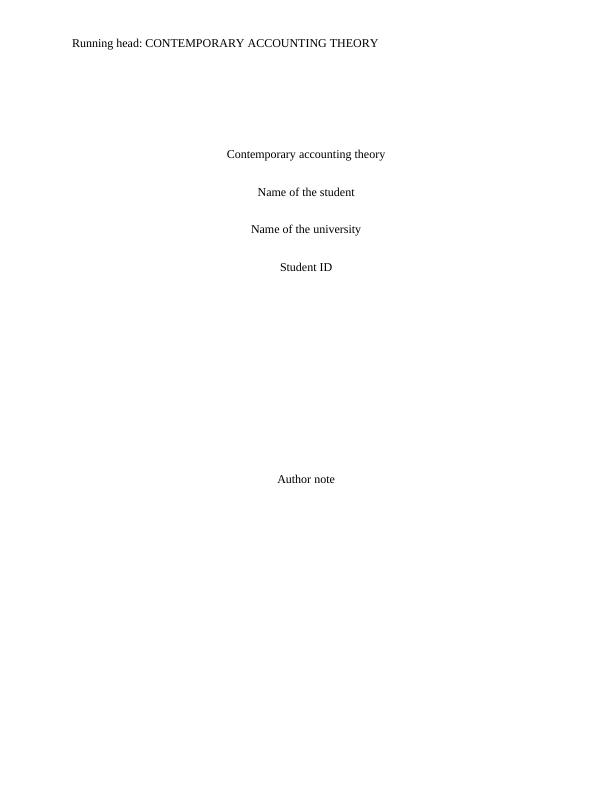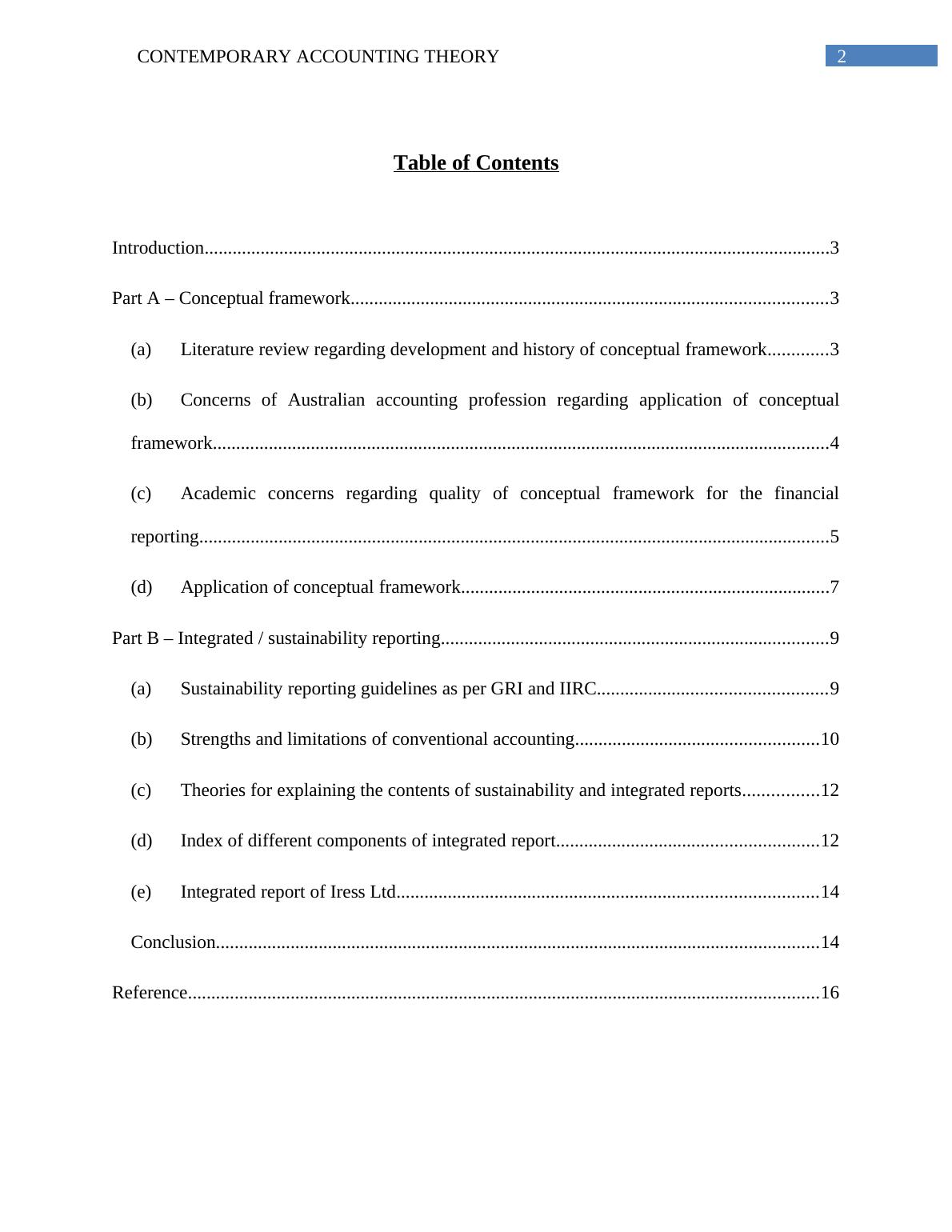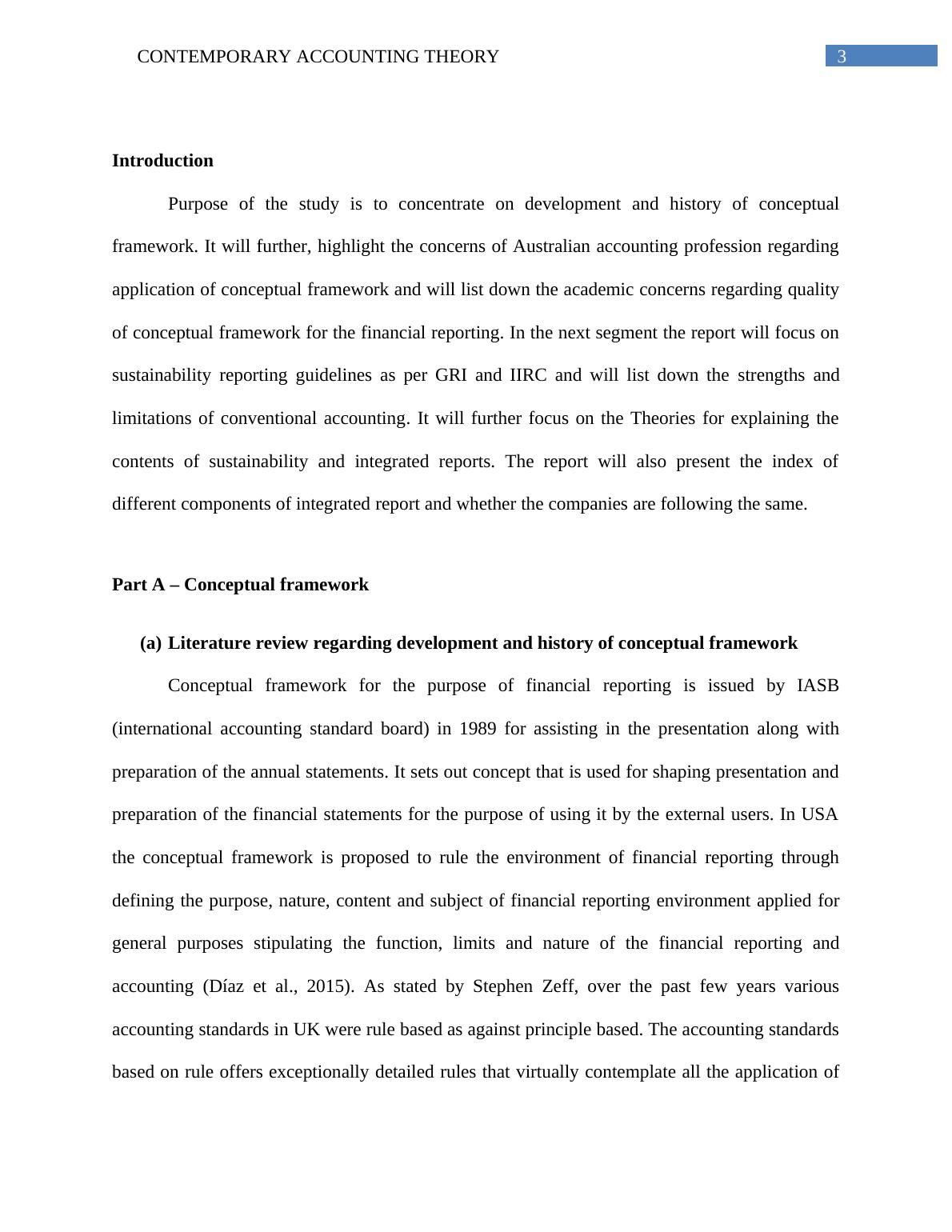Contemporary Accounting Theory
Added on 2023-04-03
20 Pages3796 Words249 Views
Running head: CONTEMPORARY ACCOUNTING THEORY
Contemporary accounting theory
Name of the student
Name of the university
Student ID
Author note
Contemporary accounting theory
Name of the student
Name of the university
Student ID
Author note

1CONTEMPORARY ACCOUNTING THEORY
Executive summary
From the report presented below it can be sated that background of conceptual framework is that
each country including UK, USA, Australia and on global basis the accountants are going
through the same thought process regarding accounting. Large numbers of stakeholders are
interested in understandable, reliable and comparable financial statements that can be used by
large numbers of users. Main objective of sustainability reporting is to establish the guiding
principles and content element that governs the entire substance of the integrated reporting.
Further, it explains fundamental concepts required for strengthening the same. Considering the
integrated reporting index it is found that Iress Ltd from Australia does not prepare integrated
report whereas South African company Naspers Ltd prepares the same and covers all the
required aspects.
Executive summary
From the report presented below it can be sated that background of conceptual framework is that
each country including UK, USA, Australia and on global basis the accountants are going
through the same thought process regarding accounting. Large numbers of stakeholders are
interested in understandable, reliable and comparable financial statements that can be used by
large numbers of users. Main objective of sustainability reporting is to establish the guiding
principles and content element that governs the entire substance of the integrated reporting.
Further, it explains fundamental concepts required for strengthening the same. Considering the
integrated reporting index it is found that Iress Ltd from Australia does not prepare integrated
report whereas South African company Naspers Ltd prepares the same and covers all the
required aspects.

2CONTEMPORARY ACCOUNTING THEORY
Table of Contents
Introduction......................................................................................................................................3
Part A – Conceptual framework......................................................................................................3
(a) Literature review regarding development and history of conceptual framework.............3
(b) Concerns of Australian accounting profession regarding application of conceptual
framework....................................................................................................................................4
(c) Academic concerns regarding quality of conceptual framework for the financial
reporting.......................................................................................................................................5
(d) Application of conceptual framework...............................................................................7
Part B – Integrated / sustainability reporting...................................................................................9
(a) Sustainability reporting guidelines as per GRI and IIRC.................................................9
(b) Strengths and limitations of conventional accounting....................................................10
(c) Theories for explaining the contents of sustainability and integrated reports................12
(d) Index of different components of integrated report........................................................12
(e) Integrated report of Iress Ltd..........................................................................................14
Conclusion.................................................................................................................................14
Reference.......................................................................................................................................16
Table of Contents
Introduction......................................................................................................................................3
Part A – Conceptual framework......................................................................................................3
(a) Literature review regarding development and history of conceptual framework.............3
(b) Concerns of Australian accounting profession regarding application of conceptual
framework....................................................................................................................................4
(c) Academic concerns regarding quality of conceptual framework for the financial
reporting.......................................................................................................................................5
(d) Application of conceptual framework...............................................................................7
Part B – Integrated / sustainability reporting...................................................................................9
(a) Sustainability reporting guidelines as per GRI and IIRC.................................................9
(b) Strengths and limitations of conventional accounting....................................................10
(c) Theories for explaining the contents of sustainability and integrated reports................12
(d) Index of different components of integrated report........................................................12
(e) Integrated report of Iress Ltd..........................................................................................14
Conclusion.................................................................................................................................14
Reference.......................................................................................................................................16

3CONTEMPORARY ACCOUNTING THEORY
Introduction
Purpose of the study is to concentrate on development and history of conceptual
framework. It will further, highlight the concerns of Australian accounting profession regarding
application of conceptual framework and will list down the academic concerns regarding quality
of conceptual framework for the financial reporting. In the next segment the report will focus on
sustainability reporting guidelines as per GRI and IIRC and will list down the strengths and
limitations of conventional accounting. It will further focus on the Theories for explaining the
contents of sustainability and integrated reports. The report will also present the index of
different components of integrated report and whether the companies are following the same.
Part A – Conceptual framework
(a) Literature review regarding development and history of conceptual framework
Conceptual framework for the purpose of financial reporting is issued by IASB
(international accounting standard board) in 1989 for assisting in the presentation along with
preparation of the annual statements. It sets out concept that is used for shaping presentation and
preparation of the financial statements for the purpose of using it by the external users. In USA
the conceptual framework is proposed to rule the environment of financial reporting through
defining the purpose, nature, content and subject of financial reporting environment applied for
general purposes stipulating the function, limits and nature of the financial reporting and
accounting (Díaz et al., 2015). As stated by Stephen Zeff, over the past few years various
accounting standards in UK were rule based as against principle based. The accounting standards
based on rule offers exceptionally detailed rules that virtually contemplate all the application of
Introduction
Purpose of the study is to concentrate on development and history of conceptual
framework. It will further, highlight the concerns of Australian accounting profession regarding
application of conceptual framework and will list down the academic concerns regarding quality
of conceptual framework for the financial reporting. In the next segment the report will focus on
sustainability reporting guidelines as per GRI and IIRC and will list down the strengths and
limitations of conventional accounting. It will further focus on the Theories for explaining the
contents of sustainability and integrated reports. The report will also present the index of
different components of integrated report and whether the companies are following the same.
Part A – Conceptual framework
(a) Literature review regarding development and history of conceptual framework
Conceptual framework for the purpose of financial reporting is issued by IASB
(international accounting standard board) in 1989 for assisting in the presentation along with
preparation of the annual statements. It sets out concept that is used for shaping presentation and
preparation of the financial statements for the purpose of using it by the external users. In USA
the conceptual framework is proposed to rule the environment of financial reporting through
defining the purpose, nature, content and subject of financial reporting environment applied for
general purposes stipulating the function, limits and nature of the financial reporting and
accounting (Díaz et al., 2015). As stated by Stephen Zeff, over the past few years various
accounting standards in UK were rule based as against principle based. The accounting standards
based on rule offers exceptionally detailed rules that virtually contemplate all the application of

End of preview
Want to access all the pages? Upload your documents or become a member.
Related Documents
Contemporary Accounting Theorylg...
|19
|3748
|429
Contemporary Accounting Theorylg...
|22
|4214
|189
Contemporary accounting theory : Assignmentlg...
|18
|5052
|61
Conceptual Framework and Integrated Reportinglg...
|19
|5298
|97
Contemporary Accounting Theory : Pioneer Food Grouplg...
|16
|4893
|31
Conceptual Framework for Corporate Reportinglg...
|17
|3848
|347
